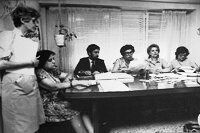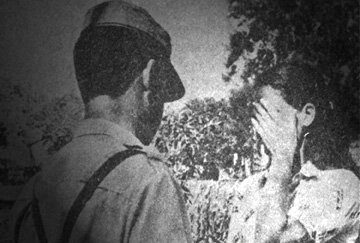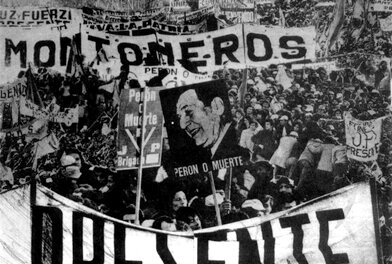Silvia Malagrino, Director
Burnt Oranges, 2005
From 1976 to 1983, Argentina - the country where I was born and grew up- underwent a military dictatorship. Although one of the shortest in duration among the several military governments that Argentina had, this one was the most brutal. Thousands of people went into political exile and an estimated three million people fled the country. Between 15,000 and 30,000 political opponents were assassinated, tortured, imprisoned, “disappeared”. The military used the “disappearance” as a repressive method to impose their authoritarian regime and erase any trace of class struggle in this new and expanded Latin American version of the Nazi’s "Nacht und Nebel." (Night and Fog)
1978, sensing the danger for my life, I decided to flee and I left Argentina to settle in the US. I have lived here ever since. I am part of the same generation as the majority of the “disappeared.”
I returned to Argentina to visit for the first time nine years after my departure, and two years after democracy was installed in 1986; I visited again later in 1992; and also in the summer of 1998. Over the course of these three trips I observed the changes and transformations that occurred in the country: in 1986, the economic depression resulting from military rule, and the confusion, paranoia, and the shock after horrifying testimonies were revealed through the Commission for the Disappearance of Persons formed by the new democratic government to try the military; in 1992, a new scenario of social unrest due to acute unemployment and hyper-inflation, the anguish and bitterness over laws that decreed the immunity and the pardon of previously convicted ex-commanders; and in 1998, a country still shaken by poverty and social unrest but with a different spirit, strengthened in the long struggle to expose criminal politics, impunity and amnesia.
I decided to make a film that would both confront the horrors of the history that marked me, as well as testify to the redeeming aspects of that history – which is the work of the organizations for human rights in Argentina, and their continuing struggle.
Burnt Oranges mixes a poetic personal narrative with documentary. The film deals with place, identity, history and memory, but it also offers a unique view into a particular historical time that has not been fully shown in other films. Other films made on the subject – are either fictional films such as the acclaimed “Official Story,” telling the story of a couple and their adopted daughter; or straight-forward documentaries such as the 1985 documentary “The Mothers,” focusing on the early struggles and tribulations of the mothers of the disappeared; and most recently “The Blonds” – a very good film about the search for identity by the a young woman whose parents are among the disappeared.
The film has a strong humanitarian content, and it celebrates the ongoing individual and collective efforts to process, to confront, and to heal the horrors of the political violence of the past. But above all, it establishes links between the struggles of the Argentine people to recover memory, truth and justice, with today’s necessity to defend human rights and preserve human dignity and democratic values.
The format I chose –a mix of personal poetic narration and documentary – enabled me to deal with personal memories, and at the same time, depict and record actual places and events in present time for the understanding of larger cultural/historical frameworks. The use of the personal first person narration, connected to the testimonies of many other people, enabled me to deal with the intricacies and the complexities of history and memory, and negotiate the private/the personal, and the cultural /historical, past and present. Finally, I wanted to confront issues relative to the nature of filming as a process that gathers fragments of experience, knowledge and information, and constructs perception and memory.
The film is timely in relation to current issues of human rights, and in relation of what can go wrong when political power is centralized, when societies become militaristic, and when the foundations of democracy break down.
In Burnt Oranges, I propose not only to take a look at the enduring consequences of political wrongdoings, but also to honor and celebrate the people’s capacity to choose life and love over death and hate. As Herbert Hirsh points out in his book Genocide and the politics of Memory: Studying Death to Preserve Life: "What we say in the present about what was done in the past not only determines how the past is viewed, but also probably influences future actions. How we remember past events has a profound impact on what we will do and how we will live."
In the Argentina of today, there have been some remarkable developments regarding the investigations of some notorious human rights cases of the 1970s. In July 2005, the organization of Forensic Anthropologists confirmed that the bodies of the founders of the Mothers of Plaza de Mayo, who were kidnapped and disappeared, had been unearthed and identified. Some weeks later, the same organization made public that the remains of the French nun Leonie Duquet, who disappeared in the '70s with their colleague Alice Dumon (still disappeared), had also been found. These events demonstrate that the repercussions of what happened thirty years ago in Argentina, with their moral, social and historical implications, are far from over.





